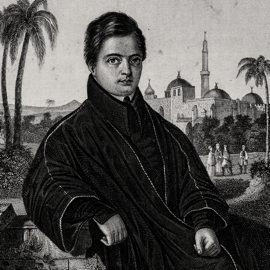Ignacy Hołowiński

Ignacy Hołowiński (1807–1855) was a clergyman and a writer. In Vilnius between 1839 and 1841 he published two volumes of Shakespeare in translation, including Hamlet (Hamlet), Romeo and Juliet (Romeo i Julia) and A Midsummer Night’s Dream (Sen w wigilią Ś. Jana) in the first volume; and Macbeth (Makbet), King Lear (Król Lear) and The Tempest (Burza) in the second. These versions were the first Polish translations from the original English, and were much discussed in reviews and literary criticism.
Hołowiński was born in Owrucz (today: Ovruch) in Polesie Wołyńskie (the region of Volhynia in modern-day Ukraine). He studied theology at Vilnius University. After his ordination in 1830, he worked in Żytomierz (today: Zhytomyr) teaching religion at a secondary school. In 1837 he took the chair of Catholic theology at Kiev University. From 1842 he was the rector at the Saint Petersburg Seminary, where he gave lectures on dogmatics, patristics and homiletics. In 1848 Hołowiński became a coadjutor bishop, and in 1851 the Archbishop of Mogilev, which made him head of the Catholic Church in Russia. He was in office over a difficult period in which the tsarist regime made efforts to subjugate the Church in Russia. The role he played has been interpreted in dramatically different ways. He has been seen both as an opportunist and a heroic champion of independence.
Hołowiński’s best known work, reissued many times, is his Pilgrimage to the Holy Land (Pielgrzymka do Ziemi Św., Wilno, 1842–1845), in which vivid accounts of geography, history and theology dovetail into a story that also presents a record of personal experience.
Ignacy Hołowiński began working towards his translations of Shakespeare at a very young age, making use of several critical editions of Shakespeare in English, French and German. His friend Placyd Jankowski was the first reader of his translations. Jankowski carried on with the work on the series of translation after Hołowiński left off.
Inspired by the ideas of Karl Wilhelm Friedrich Schlegel, Hołowiński sought to establish a Polish version of Shakespeare’s iambic pentameter. His six translations use a variety of metres (rhymed 10-, 11- and 12-syllable lines) and follow the divisions into verse and prose. Hołowiński’s lines are often irregular with respect to the rhymes and the number of syllables. The prose is dynamic and consistent in tone. Hołowiński aimed to preserve the semantic complexities of the original texts, confidently reproducing the wordplay and either explaining or replacing cultural references. Some of his translations contain introductions or extensive annotation.
The publication of Hołowiński’s translations of Shakespeare prompted a number of reviews and some critical analysis. The powerful critical reaction resulted from discrepancies between ideas about Shakespeare established at earlier stages in his reception with the actual translations that revealed the plays in a new and unsuspected light. The first response, by Józef Ignacy Kraszewski writing in St. Petersburg Weekly (Tygodnik Petersburski), was favourable. Subsequently the translations were severely criticised for unsuccessful metrical experiments and general roughness. A member of the clergy, Hołowiński was also censured for his involvement in literary work, which was deemed inappropriate for a man of the cloth. He ultimately abandoned the project in part because of the negative critical reaction, and in part because of the demands of his unfolding career in the church.
Hołowiński’s Hamlet was the basis for performances in Wilno (now Vilnius) in 1844 and 1846. Other translations were staged in Horyniec and possibly in Żytomierz (now Zhytomyr). Excerpts from his Romeo and Juliet were used in a compilation of translations for the first ever performance of the play in Warsaw, with Helena Modrzejewska in the role of Juliet.
Hołowiński’s translations have not been reissued.

Bibliography of translations
[William Shakespeare], Dzieła Wilhelma Shakspeare , tłum. Ignacy Kefaliński [I. Hołowiński], T. 1, T. Glücksberg, Wilno 1839; wyd. 2 1840 [Hamlet, Romeo i Julia, Sen w wigilią Ś. Jana].
[William Shakespeare], Dzieła Williama Shakspeare, tłum. Ignacy Kefaliński [I. Hołowiński], T. 2, T. Glücksberg, Wilno 1841 [Makbet, Król Lear, Burza].
